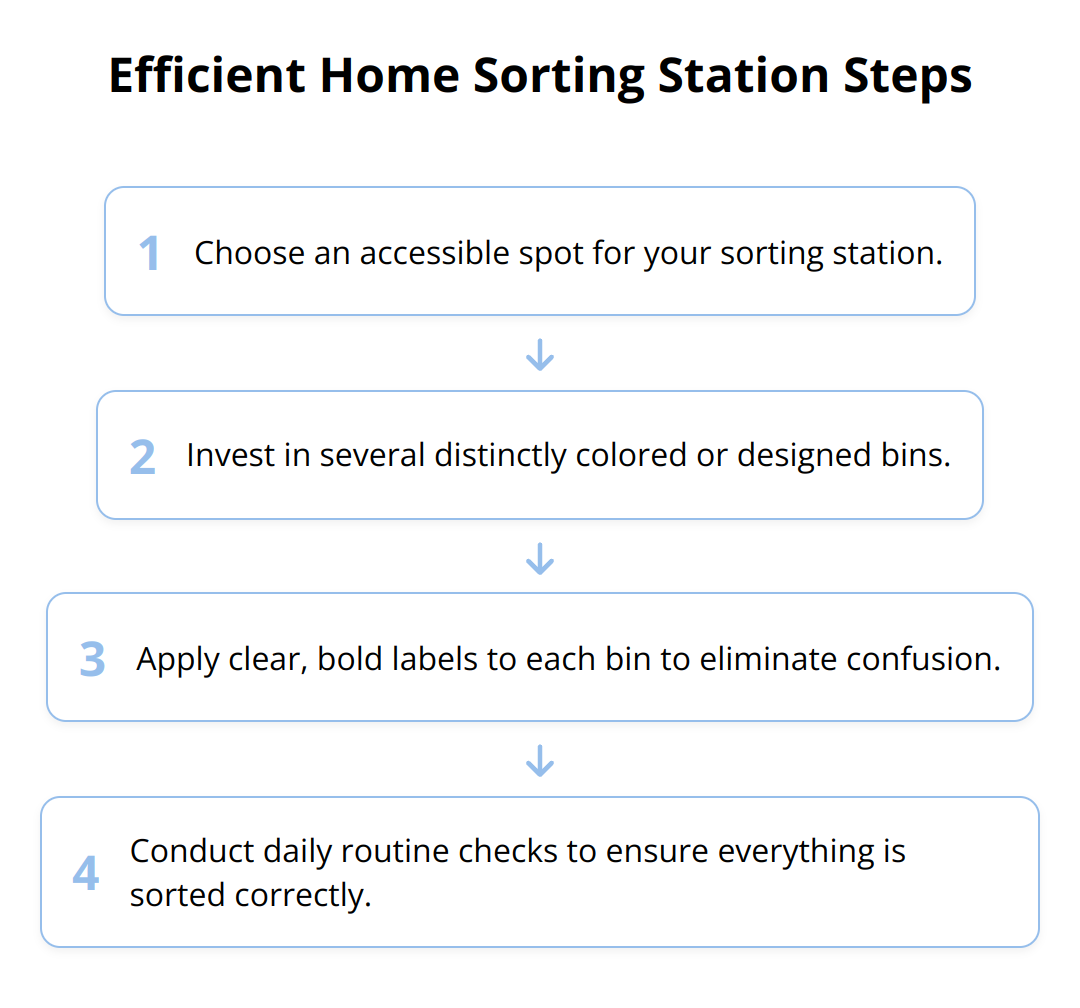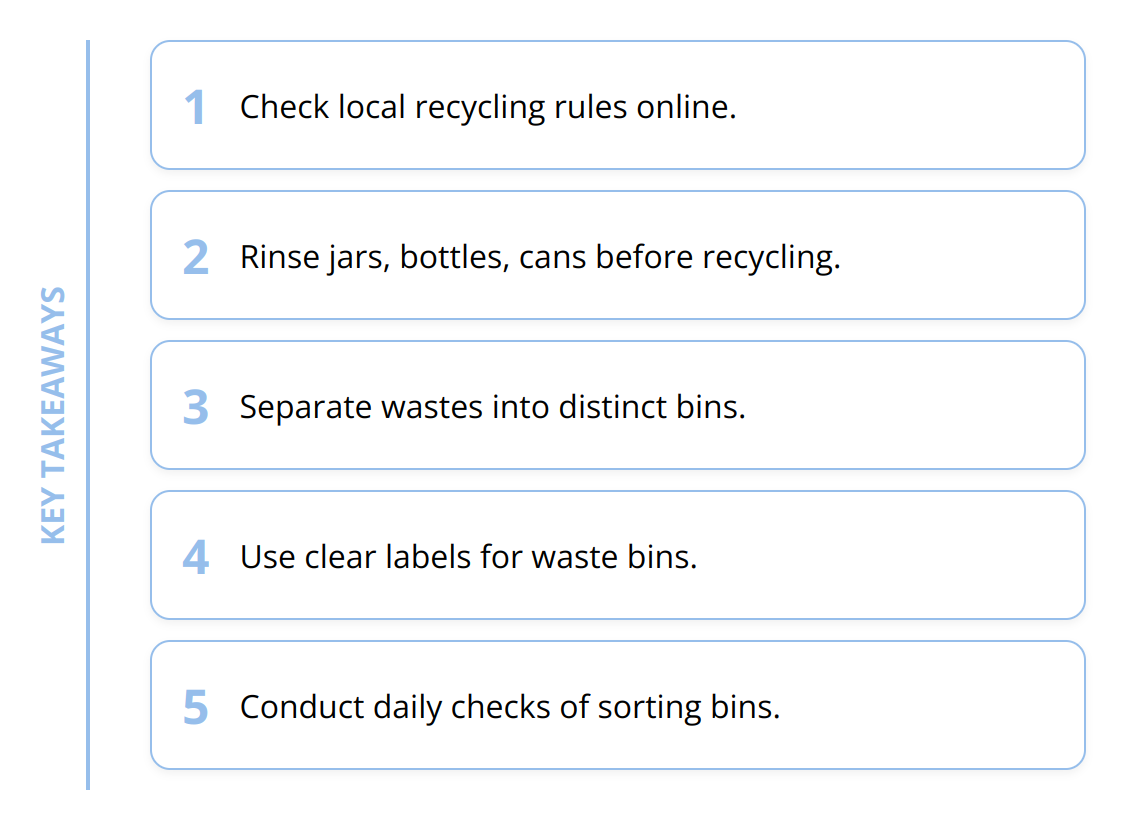Garbage sorting might seem like a simple task, but doing it effectively makes a big difference for our environment. Here at The A Team Cleaning Services, we understand the value of maintaining cleanliness and sustainability in every aspect of our lives. That’s why we’re offering some easy-to-follow advice for sorting your garbage efficiently at home. This guidance is not only about keeping spaces tidy but also about contributing to a greener planet.
Basics of Garbage Sorting
Sorting garbage is a fundamental step towards a cleaner and more sustainable environment. It’s not just about tidiness; it’s about making informed decisions that reduce waste and support recycling efforts. The first step is identifying the type of waste.
Waste can generally be categorized into three types: recyclables, organics, and residuals. Recyclables include items like paper, glass, certain plastics, and metals. These materials can be processed and made into new products, reducing the need for raw materials. Organics refer to food scraps, yard waste, and other biodegradable materials that can be composted, turning waste into nutrient-rich soil. Lastly, residuals are wastes that cannot be recycled or composted and are destined for the landfill.
Understanding your local recycling guidelines is essential. Recycling rules can differ greatly depending on where you live. Some areas accept all plastics, while others may only take certain types. Familiarizing yourself with these guidelines will prevent you from contaminating the recycling stream, ensuring that your efforts to recycle don’t go to waste.

Reducing contamination in recycling bins is paramount. A single non-recyclable item can spoil an entire batch of recycling, wasting resources and energy. Ensure what you’re discarding is clean, dry, and correctly categorized. This simple step significantly impacts the efficiency of recycling programs.
Actionable Tips:
- Check local guidelines: Visit your municipality’s website for specific recycling rules.
- Clean recyclables: Rinse jars, bottles, and cans to remove food residues.
- Separate wisely: Keep recyclables, organics, and residuals in different bins.
- Avoid wishcycling: When in doubt, find out if an item is recyclable before tossing it in the bin.

By incorporating these practices into your daily routine, you contribute to a larger movement toward sustainability and environmental preservation. Every effort counts, and it starts with understanding the basics of garbage sorting.
Efficient Home Sorting Station
Creating an efficient home sorting station is a game-changer in managing household waste effectively. The key is to blend simplicity with functionality, ensuring that sorting becomes an effortless part of daily life. A well-organized station helps in minimizing waste and maximizes recycling, contributing significantly to environmental preservation.
First, pick a spot in your home that’s easily accessible to everyone. This could be the kitchen, utility area, or garage. The goal is to make the waste sorting process as convenient as possible to encourage consistent participation from all family members.
Next, invest in several bins – one for recycling, one for organics, and another for residuals. Different colors or designs can help distinguish between the types. Clear, bold labels on each bin ensure there’s no confusion about where items should go. Visual cues are especially helpful for younger family members or guests who might not be familiar with your system.
Routine checks of the bins can preempt mistakes. A quick glance once a day ensures everything is in the right place and ready for disposal or recycling. This small step can significantly reduce the risk of contaminating recycling streams, which can undermine all your good efforts.

Incorporating these steps into your routine transforms waste sorting from a chore into a seamless habit. Engaging the whole household in this process not only lightens the load for everyone but also instills a sense of responsibility towards the environment. For more guidance on creating an eco-friendly home, explore tips on eco decluttering.
- Location: Choose an accessible spot.
- Bins: Get separate bins for different wastes.
- Labels: Use clear, bold labels.
- Routine checks: Incorporate daily bin checks.

Adopting these steps creates a strong foundation for effective garbage sorting at home, ensuring everyone contributes to a healthier planet.
Mastering Composting and Hazardous Waste Disposal
Taking garbage sorting to the next level means diving into composting and managing hazardous waste properly. Doing this reduces landfill waste and promotes a healthier environment.
Composting is an ideal way to deal with organic waste. By turning kitchen scraps, yard trimmings, and other organics into compost, you’re creating rich soil that can improve plant growth without chemical fertilizers. However, it’s vital to know what can and cannot be composted. Meat, dairy, and oils should be kept out as they can attract pests and create odors. On the other hand, fruit and vegetable scraps, coffee grounds, and eggshells are perfect for composting. If you’re limited on space, consider a worm bin or Bokashi system, which are suitable for small apartments and can handle a variety of organic matter. Get started with composting by checking your local community for composting workshops or online resources that can guide you through the process.
Hazardous waste includes items like batteries, paint, chemicals, and certain electronic devices that should never end up in regular trash bins due to their potential harm to the environment and human health. The key here is to identify local collection centers or special pick-up days for hazardous materials. Many municipalities offer services to safely dispose of these items, so take advantage of them. For electronics, look for e-waste recycling programs that ensure valuable metals are recovered, and harmful elements are contained.

To further minimize waste:
- Opt for rechargeable batteries over disposable ones.
- For items like paint or chemicals, only buy what you need or donate excess to others who can use it.
- Promote reuse by finding new purposes for items or donating them. Shopping second-hand and choosing products with minimal packaging also makes a significant difference.
Understanding and implementing advanced garbage sorting techniques come down to being mindful of what you discard and how you do it. Here are a few extra tips to remember:
- Always read the labels on products to identify hazardous materials.
- Participate in local cleanup days to help keep your community safe and clean.
- Educate others around you about best practices for waste disposal and recycling.
For more tips on creating a greener home, explore eco-friendly cleaning solutions.
By mastering these practices, you aren’t just throwing things away; you’re actively contributing to a sustainable future.
Final Thoughts
Garbage sorting transcends mere organization; it is a vital component of sustainable living that impacts both our environment and future generations. Proper sorting and recycling foster a cycle of use and reuse, minimizing waste and conserving resources. By embracing these practices, we make a statement about the kind of world we wish to create and live in.

Adopting and refining waste management techniques is an ongoing process. New recycling technologies and guidelines emerge, requiring us to stay informed and adaptable. It’s a journey of continual learning, but one that yields significant benefits for our planet. Engaging with local community programs and educational resources can enhance our understanding and effectiveness in this critical area.
Every effort towards efficient waste sorting and green living sends ripples through our communities, inspiring others to take action. This collective movement towards sustainability can lead to an environment that is healthier and more vibrant for all its inhabitants. By making conscious choices about waste disposal, we lay the groundwork for a brighter, cleaner future.
At The A Team Cleaning Services, we’re committed to playing our part in this essential process. Our professional cleaning services contribute to healthier, more sustainable living spaces, aligning with broader environmental goals. By choosing us, you opt for a clean and inviting space that respects the planet.
We encourage you to take these steps towards better waste management, and invite you to explore how our cleaning solutions can further enhance your home or business environment. Together, let’s commit to a lifestyle that prioritizes sustainability, sets an example for others, and contributes to a more sustainable world.
